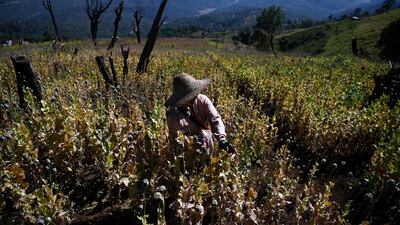Myanmar produced the largest amount of opium in the world last year, figures compiled by the UN show.
Opium production shot up by 36 per cent in the South-East Asian country, the UN Office on Drugs and Crime reported on Tuesday.
The illegal drug, used in heroin and other opiates, is produced through cultivation of poppies.
About 1,080 tonnes of opium was produced in Myanmar last year, the largest volume since 2001, the UN figures show.
At least 47,000 hectares of land are currently under poppy production in the country, an increase of 18 per cent compared with 2022.
The rise in Myanmar's output coincides with a striking drop in cultivation in Afghanistan, which was previously the world's largest producer of opium.
In November, the UN reported that poppy cultivation had dramatically declined in all parts of Afghanistan after the Taliban announced a ban in April last year. The militant group returned to power in 2021.
Annual opium production dropped from 6,200 tonnes in 2022 to 333 tonnes in 2023, according to the UN.
The area under cultivation declined 95 per cent, from 233,000 to hectares to 10,800 hectares.
Farmers in Afghanistan have traditionally relied on opium for an important source of income, the UN said.

“This presents a real opportunity to build towards long-term results against the illicit opium market and the damage it causes both locally and globally,” said Ghada Waly, UNODC executive director, at the time of the report's release.
“At the same time, there are important consequences and risks that need to be addressed for an outcome that is ultimately positive and sustainable, especially for the people of Afghanistan,” she said.
In Myanmar, the most significant increases in production were registered in Shan State, where cultivation rose by 20 per cent, followed by Chin and Kachin, where it grew by 10 per cent and 6 per cent respectively, the UN said.
These states have all been sites of clashes between Myanmar's military junta and various rebel groups, including ethnic minority separatists.
Myanmar has been in a state of civil unrest since a military coup in February 2021 and the subsequent crackdown on protests led opposition groups to take up arms.
The UN report linked the rise in cultivation to instability and insecurity, as well as poverty and lack of government services.
“The economic, security and governance disruptions that followed the military takeover of February 2021 continue to drive farmers in remote areas towards opium to make a living,” UNODC Regional Representative Jeremy Douglas said in a statement.
“The intensification of conflict in Shan and other border areas is expected to accelerate this trend.”

